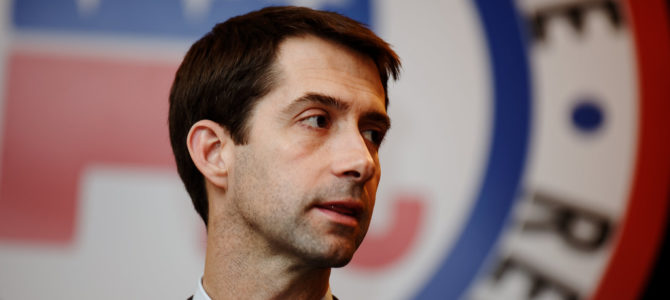In a Wednesday op-ed for The New York Times, Sen. Tom Cotton, R-AR, came down hard on the rioters behind the destruction of nearly every major American city within the last week. After condemning their actions as empty and harmful, he called for federal support of local law enforcement to stop the recklessness.
“These rioters, if not subdued, not only will destroy the livelihoods of law-abiding citizens but will also take more innocent lives,” Cotton wrote. “Many poor communities that still bear scars from past upheavals will be set back still further.”
At least four The New York Times reporters have tweeted in response to Cotton’s article saying the publication of Cotton’s article puts Black New York Times staff in danger.
Running this puts Black @nytimes staff in danger. pic.twitter.com/nI887cUYjQ
— Kwame Opam (@kwameopam) June 3, 2020
As some are criticizing The New York Times for even running the op-ed, it brings to people’s attention the debate of free speech versus violent speech.
Although Twitter and the mainstream media don’t reflect it, a recent poll shows 58 percent of registered voters, nearly half of whom are Democrats and 37 percent of whom are black, would support cities’ using military force to address protests that broke out in response to the death of George Floyd.
In response to elites who have excused the behavior as appropriate for the racial injustice committed against George Floyd, Cotton wrote “Those excuses are built on a revolting moral equivalence of rioters and looters to peaceful, law-abiding protesters. A majority who seek to protest peacefully shouldn’t be confused with bands of miscreants.”
Looters, he argued, have no interest in honoring Floyd, but are rather in it for the mere thrill of destruction and stealing. Left-wing radicals such as Antifa have exploited Floyd’s death for these purposes.
In noting the lack of adequate law enforcement in many areas, Cotton criticized “feckless politicians” for failing to take action while looters wreak havoc on their cities. He argued that sending backup to these cities is the only possibility to promote peace and lawfulness. Where governors have failed to deploy the National Guard or in cases where it’s not enough, Cotton called on President Trump to send military troops to areas in need under The Insurrection Act.
It’s common for the president to enlist the National Guard to quell riots, examples of which can be found throughout the twentieth century. Most recently, President George H.W. Bush deployed the National Guard to stop the Los Angeles race riots in 1992.
“He acknowledged his disgust at Rodney King’s treatment — ‘what I saw made me sick’ — but he knew deadly rioting would only multiply the victims, of all races and from all walks of life,” Cotton wrote.
Despite the possibility of campaigns for Twitter wars and other forms of backlash, Cotton was convicted in his ideas.
“In normal times, local law enforcement can uphold public order,” Cotton said. “But in rare moments, like ours today, more is needed, even if many politicians prefer to wring their hands while the country burns.”









